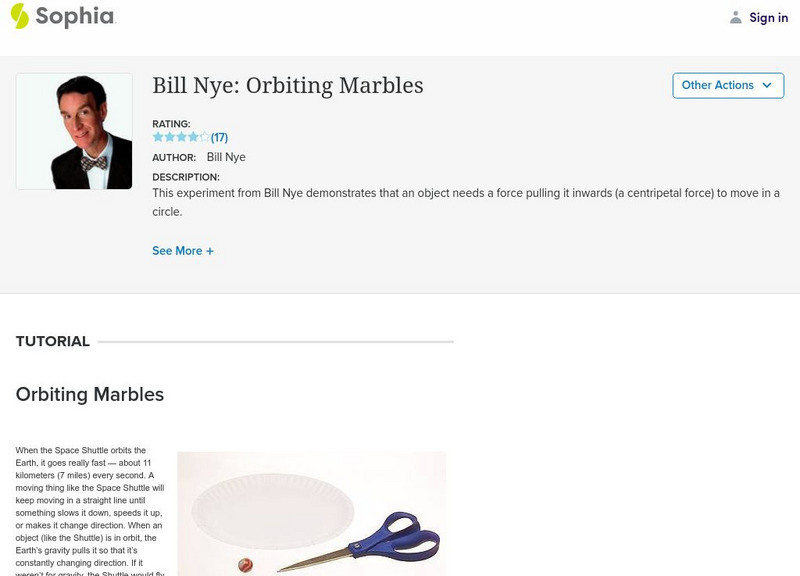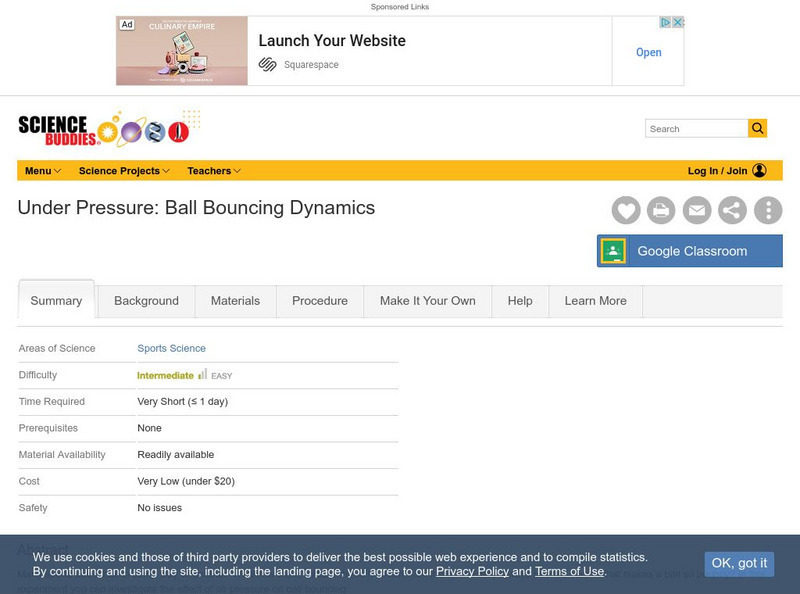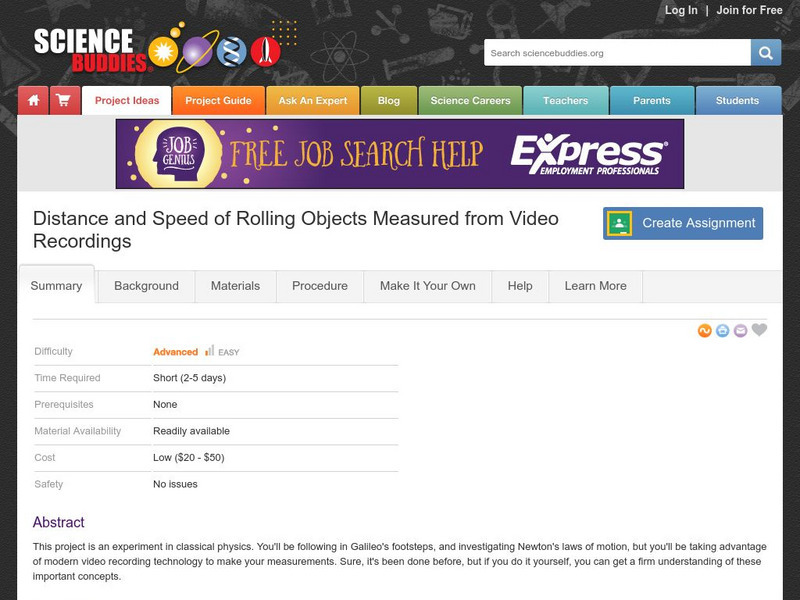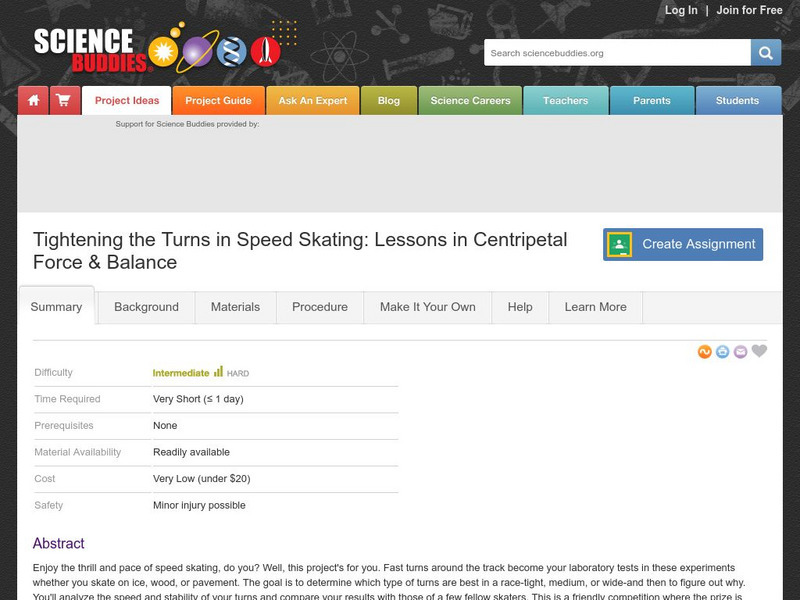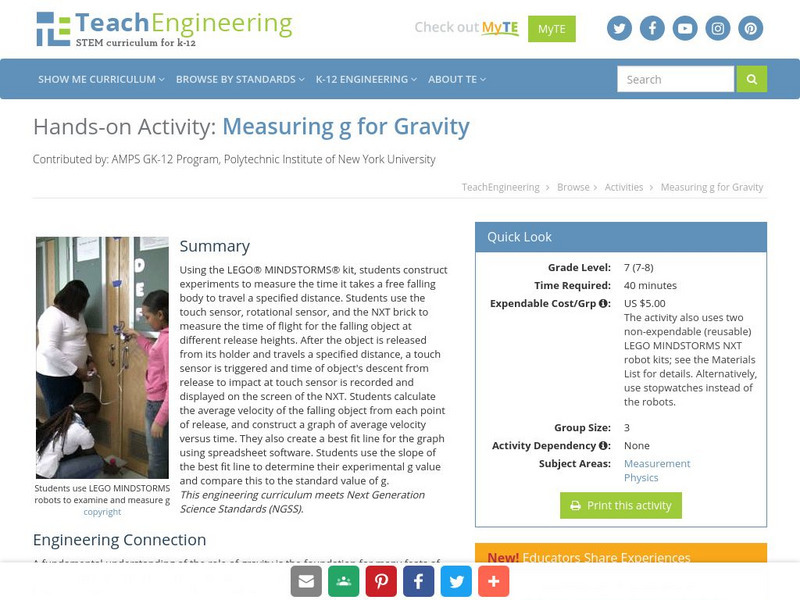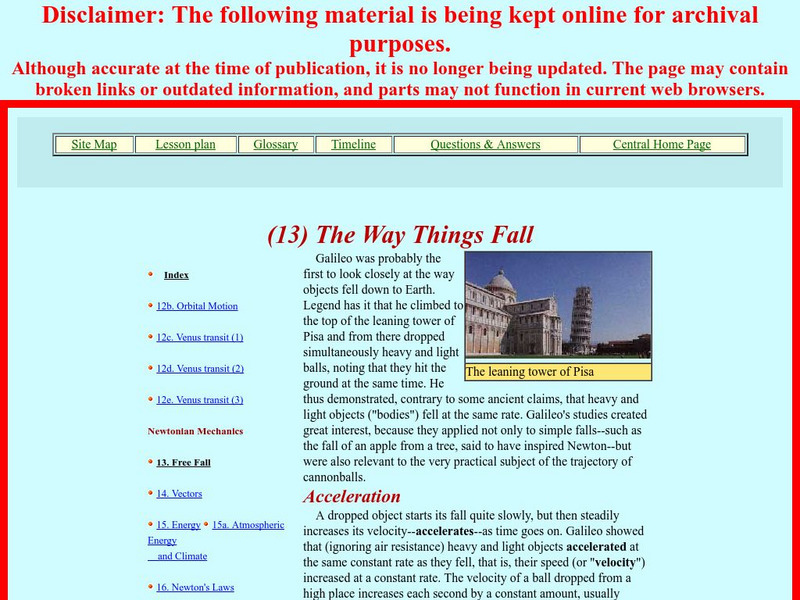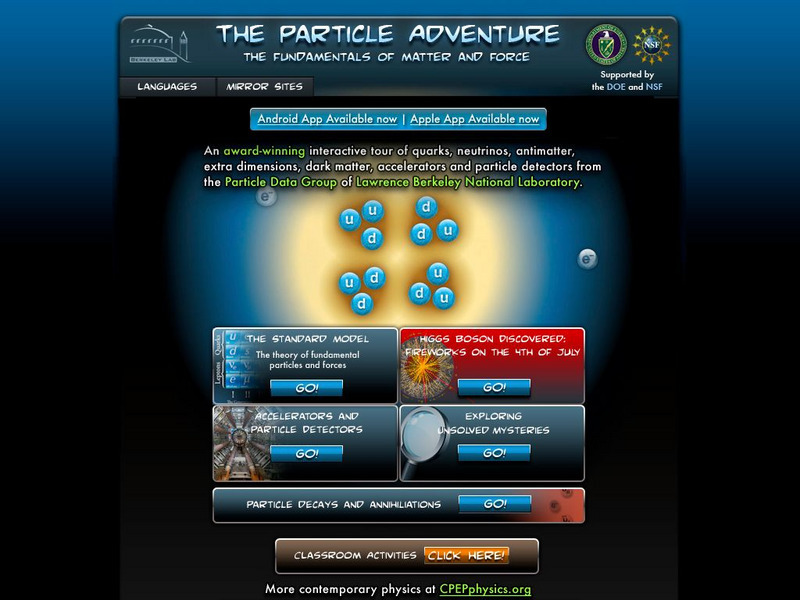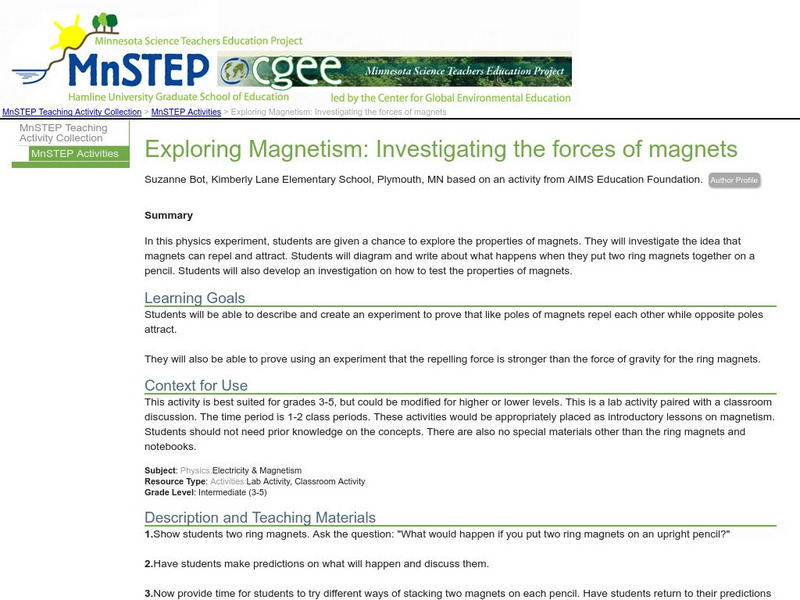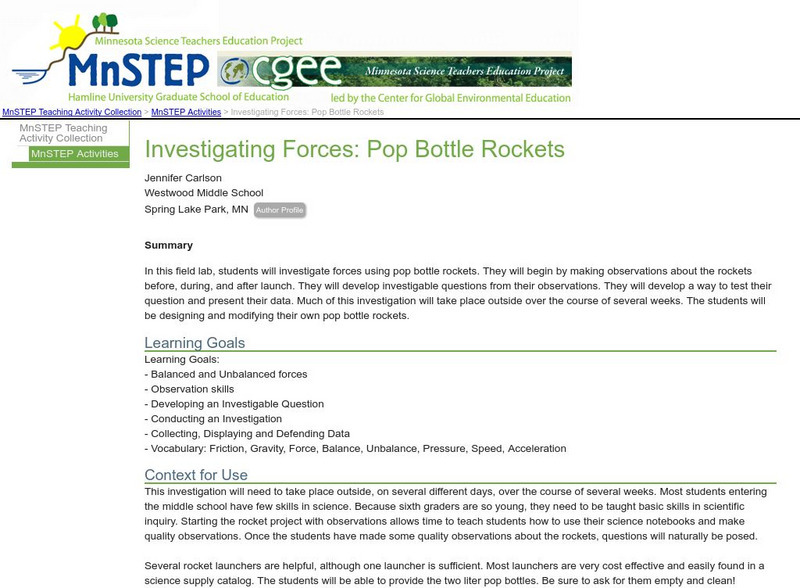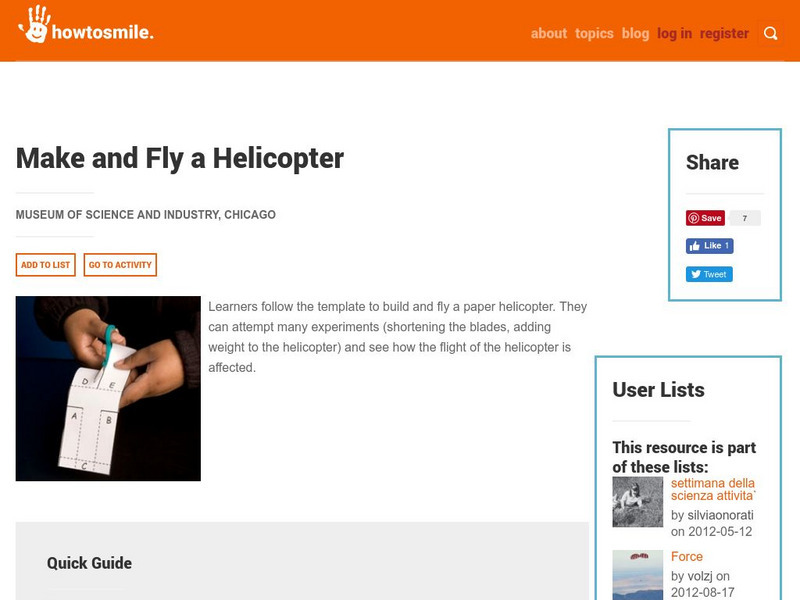Science Buddies
Science Buddies: Project Ideas: Popping an Ollie: Skateboards and Physics
In this science fair project, investigate the effect of speed on the distance and height of the skateboard trick the "ollie". The Science Buddies project ideas are set up consistently beginning with an abstract, objective, and...
Sophia Learning
Sophia: Space Science: Bill Nye: Orbiting Marbles
Created to teach students of the 21st century, SOPHIA is bringing outer space straight to your fingertips. Become the commander of your own learning experiences as you take part in this interactive experiment.
Sophia Learning
Sophia: Space Science: Bill Nye: Weightless Clothespin
Created to teach students of the 21st century, SOPHIA is bringing the world of science straight to your fingertips. Become the commander of your own learning experiences as you take part in this interactive experiment.
Science Buddies
Science Buddies: Under Pressure: Ball Bouncing Dynamics
Many sports use a ball in some way or another. We throw them, dribble them, hit them, kick them, and they always bounce back. What makes a ball so bouncy? In this experiment you can investigate the effect of air pressure on ball bouncing.
Science Buddies
Science Buddies: Distance and Speed of Rolling Objects
This project is an experiment in classical physics. You'll be following in Galileo's footsteps, and investigating Newton's laws of motion, but you'll be taking advantage of modern video recording technology to make your measurements. The...
Science Buddies
Science Buddies: Tightening the Turns in Speed Skating
Fast turns around the track can become your laboratory tests in these experiments, whether you skate on ice, wood, or pavement. The goal is to determine which type of turns are best in a race - tight, medium, or wide - and then to figure...
TeachEngineering
Teach Engineering: Measuring G
Using the LEGO MINDSTORMS NXT kit, students construct experiments to measure the time it takes a free falling body to travel a specified distance. Students use the touch sensor, rotational sensor, and the NXT brick to measure the time of...
Bill Nye
Bill Nye: Falling for Science
Try this at-home science experiment to learn about acceleration due to gravity.
NASA
Nasa: The Way Things Fall
This site from NASA compares free falling motion to falling with air resistance. Discusses Galileo's experiment. Explains why we believe all objects free fall with the same acceleration.
Annenberg Foundation
Annenberg Learner: Amusement Park Physics: The Principles of Free Fall
An article describing free fall principles in roller coaster rides. In addition to the explanation of free fall, an experiment is described that allows you to test free fall with a cup of water. Part of a larger presentation on roller...
Bill Nye
Bill Nye: Barometer in a Bottle
Try this at-home science experiment to learn how to build your own barometer.
Lawrence Berkeley National Laboratory
Berkeley Lab: The Particle Adventure
Visit this site for an interactive tour of the atom and all aspects of particle physics. View the animations available with almost every description on this site. A great place for the fundamentals of particles and forces including a...
Other
Steve Spangler Science: Soda Bottle Prank
This resource demonstrates atmospheric pressure using a soda bottle and water.
Exploratorium
Exploratorium: Science Snacks: Hand Held Heat Engine
Can you defy the force of gravity by making liquid in a toy rise and fall without turning it over? This experiment will show you how to use hand boiler that uses temperature and pressure to move liquid into the top chamber.
TED Talks
Ted: Ted Ed: Candy Corn in Space
Watch NASA astronaut Don Pettit create zero gravity candy corn balls on the International Space Station. [2:57]
Exploratorium
Exploratorium: Science Snacks: Soap Film Painting
Investigate the constructive and destructive interference of waves as they reflect off the front and back surfaces of soap film. See what colorful effects can be created on a large, vertical soap film surface where gravity comes into play.
Bill Nye
Bill Nye: Barometer in a Bottle
This tutorial by Bill Nye explains how to make a simple barometer using a jar and a balloon. The barometer is an old and accurate first look at predicting the weather by examining the pressure of the atmosphere. Discover how atmospheric...
TeachEngineering
Teach Engineering: Wow! That Captures It!
Students learn how motion capture (mo-cap) technology enables computer animators to create realistic effects. They learn the importance of center of gravity in animation and how to use the concept of center of gravity in writing an...
Science Education Resource Center at Carleton College
Serc: Exploring Magnetism: Investigating the Forces of Magnets
Students describe and create an experiment to prove that like poles of magnets repel each other while opposite poles attract. Using the experiment, they use the data to support the claim that the repelling force is stronger than the...
TeachEngineering
Teach Engineering: Forces and Graphing
This activity can be used to explore forces acting on an object, to practice graphing experimental data, and/or to introduce the algebra concepts of slope and intercept of a line. A wooden 2x4 beam is set on top of two scales. Students...
Science Education Resource Center at Carleton College
Serc: Investigating Forces: Pop Bottle Rockets
In this lab, learners will work on scientific inquiry skills: observation, developing questions, conducting an experiment, and collecting data. They will investigate forces using pop bottle rockets that they have designed.
Other
National Science Digital Library: Smile: Make and Fly a Helicopter
Sourced by Chicago's Museum of Science and Industry, students and educators will engage in building a helicopter and making it fly. Adaptations of extra weight or shortening blades will alter flight abilities making for an exciting...
TeachEngineering
Teach Engineering: Tightrope Trials
To learn about the concept of center of mass, students examine how objects balance. They make symmetrical cut-outs of different "creatures" and experiment with how they balance on a tightrope of string. Students see the concept of center...
Bill Nye
Bill Nye: Twistin' Tornado
This experiment with Bill Nye explains how to make a tornado in a bottle.

